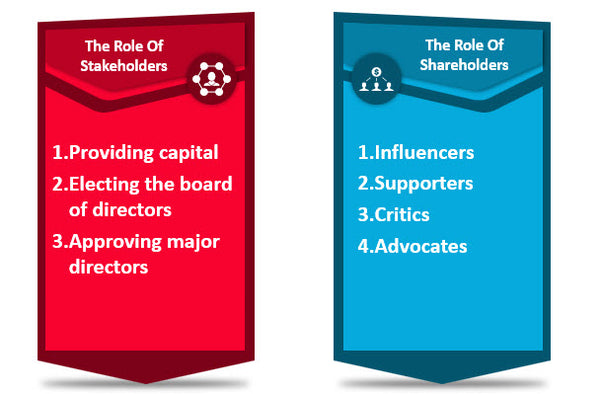Shareholders vs Stakeholders: What's the Difference?
In today's business landscape, companies have a significant impact on society and the environment. However, companies must balance their profit-driven goals with their obligations to their stakeholders. The terms "shareholder" and "stakeholder" are often used interchangeably, but they have distinct meanings. In this blog post, we will delve into the differences between shareholders and stakeholders and explore why businesses must consider both. Join us as we explore this vital topic in the world of business.

What Are Shareholders?
- Shareholders are individuals or entities who own shares or stocks in a company. They invest their money in the company with the expectation of earning a return on their investment through dividends and/or an increase in the value of their shares.
- Shareholders have the right to vote and participate in decision-making concerning the company's operations. They also have the potential to profit from the company's success but may also incur losses if the company performs poorly.
- Some shareholders, such as institutional investors, may hold a significant percentage of a company's shares and have the power to influence decision-making and corporate governance. Other shareholders may be individual investors who hold a small number of shares and have less influence.
What Are Stakeholders?
- Stakeholders are individuals or groups who have an interest or concern in an organization or a project, and who can influence or be influenced by the organization or project.
- Examples of stakeholders include employees, customers, shareholders, suppliers, government agencies, communities, and non-governmental organizations. Their interests can be economic, social, environmental, or political, and they may have different priorities and perspectives on how the organization or project should be managed and its outcomes.
- Effectve stakeholder management requires identifying and engaging with stakeholders, understanding and addressing their concerns and expectations, and building long-term relationships based on trust and respect.
Who Do Shareholders Represent?
- Shareholders represent the owners of a company and hold a portion of the company's ownership in the form of stocks or shares. They have the right to vote on important corporate decisions and may receive dividends as a share of the company's profits.
- Shareholders also have the right to sell their shares on the stock exchange market and can benefit from the appreciation of the company's stock value.
- As owners of the company, shareholders elect the board of directors, which is responsible for overseeing the management of the company and making strategic decisions.
- Shareholders have the power to approve or reject major decisions, such as mergers and acquisitions, executive compensation, and changes in corporate structure.
- Additionally, shareholders have the right to access certain information about the company, such as financial reports and other important documents. This transparency is important for shareholders to make informed decisions about their investments and to hold management accountable for their actions.
Who Do Stakeholders Represent?
Stakeholders represent individuals, groups, or organizations that have an interest or stake in a particular project, organization, or decision. They are those who are affected by or can affect the outcomes, success, or direction of a project or initiative. Stakeholders can include a wide range of individuals and entities such as
- Shareholders/Owners: These are individuals or entities that own shares or have a financial stake in a company or organization. They are often concerned with financial returns and long-term sustainability.
- Employees: The people working within the organization have a stake in its success. They may be concerned with job security, fair compensation, and a positive work environment.
- Customers/Clients: These are the individuals or organizations who use or purchase the products, services, or solutions provided by the organization. Their satisfaction and needs are crucial for business success.
The Role of Shareholders
Shareholders are individuals or entities that own shares in a company, which represents a portion of the ownership stake in the business. Shareholders have a key role in the company, as they provide capital investment to the business and expect to earn a return on their investment in the form of dividends and capital gains.
- Providing capital: Shareholders provide initial and ongoing capital to the company, which is needed for its operations and growth.
- Electing the board of directors: Shareholders have the right to elect the board of directors, who are responsible for making strategic decisions on behalf of the company.
- Approving major decisions: Shareholders also have a say in major business decisions such as mergers and acquisitions, issuing new shares, and changing the company's articles of incorporation.
The Role of Stakeholders
Stakeholders are individuals or groups who have an interest or concern in an organization or project. They can be internal (employees, shareholders) or external (customers, suppliers, government regulators) to the organization.
The role of stakeholders is important because they can influence the success of the organization or project. Their input can help shape the strategy, goals, and actions of the organization. They also have the power to affect the resources, funding, and support that the organization receives.
- Influencers: They can influence the decision-making process and provide insights on how to improve the organization's operations.
- Supporters: They can provide funding, resources, and other forms of support to help the organization achieve its goals.
- Critics: They can raise concerns and provide feedback on the organization's actions and performance.
- Advocates: They can promote the organization's mission and values and defend its reputation.
Therefore, understanding the needs, expectations, and concerns of stakeholders, and engaging with them in a meaningful way can help organizations to build trust, create shared value, and achieve success.
Should Companies Consider Both Shareholders and Stakeholders?
Yes, companies should consider both shareholders and stakeholders. Shareholders have invested in the company and expect to receive a return on their investment, which is typically reflected in the company's stock price or dividend payments. However, stakeholders are individuals or groups that can be affected by a company's actions, such as employees, customers, suppliers, and local communities.
Ignoring the concerns and needs of stakeholders can lead to negative consequences for the company, including reputational damage, legal repercussions, and loss of customer loyalty. Ultimately, a company's long-term success depends on creating value for both shareholders and stakeholders. Companies that operate in a socially responsible and sustainable manner are more likely to gain the support of stakeholders, which can lead to increased shareholder value over time.




